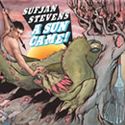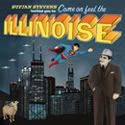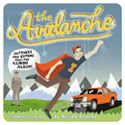this land is your land... now that you mention it.
Born in Detroit over thirty years ago with the ability to play nearly all musical instruments proficiently and an ever-sharpening aptitude for creating relatable characters and stories, one man is considered the song-writer of our generation. Establishing the prolific 50 States project in 2003 with an homage to his home state, he paved his way to release (by most accounts) the best album of 2005, the 74 minute, 22 track Come On Feel The Illinoise, solidifying Sufjan Stevens as a master of his craft.
You may be asking yourself who I could possibly be introducing Sufjan Stevens to. Your question is valid given the majority of my target audience. However, I'll admit that it was just around the Illinois era that I truly discovered Sufjan. Maybe you've avoided him because of the hype, or you just never got around to listening. Maybe you've only listened casually and have only delved into an album or two. Maybe you know every note played by every instrument on every album. Regardless, Tuesday's Spotlight is shining brightly on the savior of the concept album; the man with the next forty-eight (minimum) years of his life planned out; the truly likeable soul, Sufjan Stevens.
Sufjan's first album was an amalgam of instruments and stylistic elements. Sure, there are hints at the genuine indie-folk that would later become more predominant but, more significantly, there is a stew of influences with Middle-Eastern, Celtic, Indian, and rock flavors. Sufjan said of the album that it incorporates "traditional pop music, medieval instrumentation with Middle Eastern inflections, tape loops, digital samples, literary vocals, manic percussion, woodwinds, sitar, amp distortion and Arabic chants." It's probably the only time you'll be able to hear Sonic Youth's impact on the budding songwriter, and with the lyric "She'll shoot a super fart, the deadly silent kind" in the mix ("Super Sexy Woman"), A Sun Came is the hardest to swallow. It's significance is in hearing the progression of Stevens' work.
Those who heard A Sun Came upon it's original release may have been on the edge of their seat to hear where Stevens would go next. Where indeed. Enjoy Your Rabbit was en excursion into the vastly different world of electronic music. Not worlds apart from the work of Kid606 or even Four Tet at times, the album contained a song for every animal of the Chinese Zodiac. It's both ambient and filled with glitches, blips and found sounds. It's long and hints at Stevens' desire to create lengthy concept work, but the thing that's missing is not the heart electronic music is generally void of, it's Sufjan's refreshingly honest and fertilely touching voice. Like A Sun Came, Enjoy Your Rabbit was important for Stevens to create, both albums represent a progression with over a dozen instruments and musical programming, which would be vital for the creation of his state-based masterpieces.
Michigan was an homage to his home state, a state not well-known for being upbeat, but rather it's blue-collar (say "Git 'Er Done" and you're banned from this site) status. It's on Michigan that we first hear the charm of Sufjan's voice atop a gently picked banjo. Pensive hymns, bluegrass spirituals and upbeat arrangements driving in the same car, watching the factories and fields pass by on a drive through "The Great Lake State." Greetings From Michigan... was the album that caused a gentle wave of heads turning toward Stevens' sublimely original story-telling. Possibly just a single concept album for his home state, the idea began here.
The idea needed tweaking, and a gentle prodding in order to continue properly. Stevens needed to work in a completely different way to figure out where he was headed. Seven Swans was a sparse, largely acoustic, largely banjo-driven, significantly religious album not of Christian propaganda but rather of human compassion. It's in the stripped down and delicate nature of Seven Swans that holds it's power, "like Elliot Smith after ten years of Sunday School." (Spin) This was the first time that it was proven that Stevens is capable of working wonders with very little; a miracle-worker, if you will.
Then it happened. Even after (or perhaps sparked by) legal problems getting the album out (due simply to the original cover having a drawing of Superman), Illinois started selling and just didn't stop. Critics were amazed. Casual listeners were convinced. The Illinoise-makers were in full effect. Complete with an ironically beautiful ballad about serial killer and part-time clown John Wayne Gacy, Jr. and an homage to the Man of Steel himself, Come on feel the Illinoise's spot atop countless Top Ten lists shouldn't be contested. Read Pitchfork's glowing review here or spend some time reading up on the long list of references present in the 74 minutes here.
Somehow, in writing and recording the commodious tribute to the Prairie State, material was in over-abundance. Rather than over-populate the world with a negligible double album, Stevens cut about half of the songs in his arsenal only to return to them later in the year. The Avalanche was born and will serve as a way for fans to be held over until we are met with the next state on the list (or another out-of-left-field surprise). The surprise within the album is that it's actually fully capable of standing on it's own two feet. If you're in tune with the blog-o-sphere, you're already familiar with a few of the standout tracks from the top half of the 76 minutes of "outtakes and extras." The title track, "Dear Mr. Supercomputer," "Adlai Stevenson," and "The Henney Buggy Band" are some of the strongest tracks, but like Illinois good things come to those with patience. "The Pick-up" and "Pittsfield" are very solid, and the artwork makes the album complete. Even casual fans won't be disappointed by this collection.
The only era when there was more than a year between albums was between Enjoy Your Rabbit and Michigan. Was this Sufjan's introspective time away from music? What are you, new? In this period, Stevens and his friends recorded three EPs of Christmas music. Could there be a more glorious notion? No. There couldn't. You can find the twenty-four holiday necessities from a few places online, but I've provided a link below to a sure-fire location.
You can't afford to be missing out on the web Sufjan is spinning.






Sufjan Stevens' "We Are What You Say"
from A Sun Came
Sufjan Stevens' "Year of the Dragon"
from Enjoy Your Rabbit
Sufjan Stevens' "O Come O Come Emmanuel"
from Hark! Noel! Songs for Christmas: Volume One
Sufjan Stevens' "I Saw Three Ships"
from Hark! Noel! Songs for Christmas: Volume Two
Sufjan Stevens' "Come On! Let's Boogey to the Elf Dance!"
from Ding! Dong! Songs for Christmas: Volume Three
Download the EPs in their entirety at Irresponsible Journalism
Sufjan Stevens' "Detroit, Lift Up Your Weary Head! (Rebuild! Restore! Reconsider!)"
from Greetings From Michigan: The Great Lake State
Sufjan Stevens' "All the Trees of the Field Will Clap Their Hands"
from Seven Swans
Sufjan Stevens' "Casimir Pulaski Day"
& "The Predatory Wasp of the Palisades Is Out To Get Us!"
from Come On Feel The Illinoise
Sufjan Stevens' "No Man's Land"
& "Chicago (Multiple Personality Disorder version)"
from The Avalanche
You may be asking yourself who I could possibly be introducing Sufjan Stevens to. Your question is valid given the majority of my target audience. However, I'll admit that it was just around the Illinois era that I truly discovered Sufjan. Maybe you've avoided him because of the hype, or you just never got around to listening. Maybe you've only listened casually and have only delved into an album or two. Maybe you know every note played by every instrument on every album. Regardless, Tuesday's Spotlight is shining brightly on the savior of the concept album; the man with the next forty-eight (minimum) years of his life planned out; the truly likeable soul, Sufjan Stevens.
Sufjan's first album was an amalgam of instruments and stylistic elements. Sure, there are hints at the genuine indie-folk that would later become more predominant but, more significantly, there is a stew of influences with Middle-Eastern, Celtic, Indian, and rock flavors. Sufjan said of the album that it incorporates "traditional pop music, medieval instrumentation with Middle Eastern inflections, tape loops, digital samples, literary vocals, manic percussion, woodwinds, sitar, amp distortion and Arabic chants." It's probably the only time you'll be able to hear Sonic Youth's impact on the budding songwriter, and with the lyric "She'll shoot a super fart, the deadly silent kind" in the mix ("Super Sexy Woman"), A Sun Came is the hardest to swallow. It's significance is in hearing the progression of Stevens' work.
Those who heard A Sun Came upon it's original release may have been on the edge of their seat to hear where Stevens would go next. Where indeed. Enjoy Your Rabbit was en excursion into the vastly different world of electronic music. Not worlds apart from the work of Kid606 or even Four Tet at times, the album contained a song for every animal of the Chinese Zodiac. It's both ambient and filled with glitches, blips and found sounds. It's long and hints at Stevens' desire to create lengthy concept work, but the thing that's missing is not the heart electronic music is generally void of, it's Sufjan's refreshingly honest and fertilely touching voice. Like A Sun Came, Enjoy Your Rabbit was important for Stevens to create, both albums represent a progression with over a dozen instruments and musical programming, which would be vital for the creation of his state-based masterpieces.
Michigan was an homage to his home state, a state not well-known for being upbeat, but rather it's blue-collar (say "Git 'Er Done" and you're banned from this site) status. It's on Michigan that we first hear the charm of Sufjan's voice atop a gently picked banjo. Pensive hymns, bluegrass spirituals and upbeat arrangements driving in the same car, watching the factories and fields pass by on a drive through "The Great Lake State." Greetings From Michigan... was the album that caused a gentle wave of heads turning toward Stevens' sublimely original story-telling. Possibly just a single concept album for his home state, the idea began here.
The idea needed tweaking, and a gentle prodding in order to continue properly. Stevens needed to work in a completely different way to figure out where he was headed. Seven Swans was a sparse, largely acoustic, largely banjo-driven, significantly religious album not of Christian propaganda but rather of human compassion. It's in the stripped down and delicate nature of Seven Swans that holds it's power, "like Elliot Smith after ten years of Sunday School." (Spin) This was the first time that it was proven that Stevens is capable of working wonders with very little; a miracle-worker, if you will.
Then it happened. Even after (or perhaps sparked by) legal problems getting the album out (due simply to the original cover having a drawing of Superman), Illinois started selling and just didn't stop. Critics were amazed. Casual listeners were convinced. The Illinoise-makers were in full effect. Complete with an ironically beautiful ballad about serial killer and part-time clown John Wayne Gacy, Jr. and an homage to the Man of Steel himself, Come on feel the Illinoise's spot atop countless Top Ten lists shouldn't be contested. Read Pitchfork's glowing review here or spend some time reading up on the long list of references present in the 74 minutes here.
Somehow, in writing and recording the commodious tribute to the Prairie State, material was in over-abundance. Rather than over-populate the world with a negligible double album, Stevens cut about half of the songs in his arsenal only to return to them later in the year. The Avalanche was born and will serve as a way for fans to be held over until we are met with the next state on the list (or another out-of-left-field surprise). The surprise within the album is that it's actually fully capable of standing on it's own two feet. If you're in tune with the blog-o-sphere, you're already familiar with a few of the standout tracks from the top half of the 76 minutes of "outtakes and extras." The title track, "Dear Mr. Supercomputer," "Adlai Stevenson," and "The Henney Buggy Band" are some of the strongest tracks, but like Illinois good things come to those with patience. "The Pick-up" and "Pittsfield" are very solid, and the artwork makes the album complete. Even casual fans won't be disappointed by this collection.
The only era when there was more than a year between albums was between Enjoy Your Rabbit and Michigan. Was this Sufjan's introspective time away from music? What are you, new? In this period, Stevens and his friends recorded three EPs of Christmas music. Could there be a more glorious notion? No. There couldn't. You can find the twenty-four holiday necessities from a few places online, but I've provided a link below to a sure-fire location.
You can't afford to be missing out on the web Sufjan is spinning.






Sufjan Stevens' "We Are What You Say"
from A Sun Came
Sufjan Stevens' "Year of the Dragon"
from Enjoy Your Rabbit
Sufjan Stevens' "O Come O Come Emmanuel"
from Hark! Noel! Songs for Christmas: Volume One
Sufjan Stevens' "I Saw Three Ships"
from Hark! Noel! Songs for Christmas: Volume Two
Sufjan Stevens' "Come On! Let's Boogey to the Elf Dance!"
from Ding! Dong! Songs for Christmas: Volume Three
Download the EPs in their entirety at Irresponsible Journalism
Sufjan Stevens' "Detroit, Lift Up Your Weary Head! (Rebuild! Restore! Reconsider!)"
from Greetings From Michigan: The Great Lake State
Sufjan Stevens' "All the Trees of the Field Will Clap Their Hands"
from Seven Swans
Sufjan Stevens' "Casimir Pulaski Day"
& "The Predatory Wasp of the Palisades Is Out To Get Us!"
from Come On Feel The Illinoise
Sufjan Stevens' "No Man's Land"
& "Chicago (Multiple Personality Disorder version)"
from The Avalanche


0 Comments:
Post a Comment
<< Home